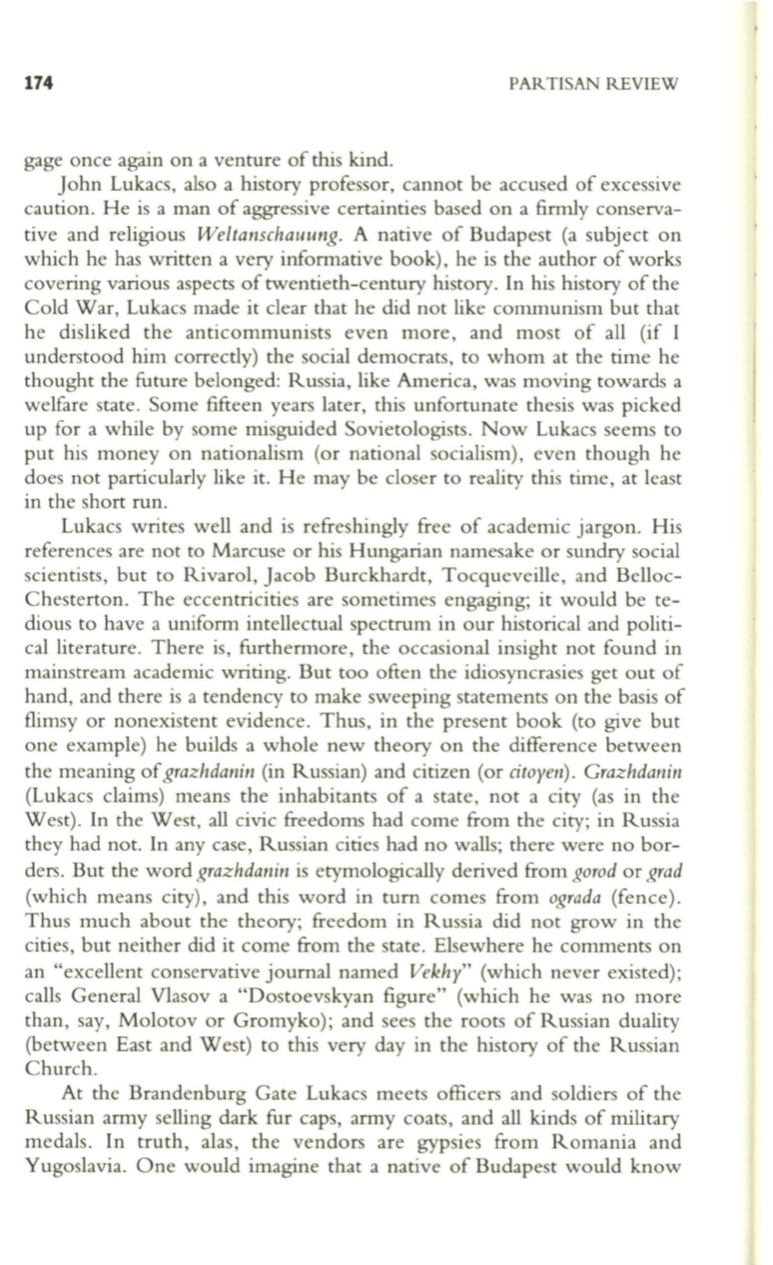
174
PARTISAN REVIEW
gage once again on a venture of this kind.
John Lukacs, also a history professor, cannot be accused of excessive
caution. He is a man of aggressive certainties based on a firmly conserva–
tive and religious
Weltanschauung.
A native of Budapest (a subject on
which he has written a very informative book), he is the author of works
covering various aspects of twentieth-century history. In his history of the
Cold War, Lukacs made it clear that he did not like communism but that
he disliked the anticommunists even more, and most of all (if I
understood him correctly) the social democrats, to whom at the time he
thought the future belonged: Russia, like America, was moving towards a
welfare state. Some fifteen years later, this unfortunate thesis was picked
up for a while by some misguided Sovietologists. Now Lukacs seems to
put his money on nationalism (or national socialism), even though he
does not particularly like it. He may be closer to reality this time, at least
in the short run.
Lukacs writes well and is refreshingly free of academic jargon. His
references are not to Marcuse or his Hungarian namesake or sundry social
scientists, but to Rivarol, Jacob Burckhardt, Tocqueveille, and Belloc–
Chesterton. The eccentricities are sometimes engaging; it would be te–
dious to have a uniform intellectual spectrum in our historical and politi–
cal literature. There is, furthermore, the occasional insight not found in
mainstream academic writing. But too often the idiosyncrasies get out of
hand , and there is a tendency to make sweeping statements on the basis of
flimsy or nonexistent evidence. Thus, in the present book (to give but
one example) he builds a whole new theory on the difference between
the meaning of
grazhdanin
(in Russian) and citizen (or
citoyen). Grazhdanin
(Lukacs claims) means the inhabitants of a state, not a city (as in the
West) . In the West, all civic freedoms had come from the city; in Russia
they had not. In any case, Russian cities had no walls; there were no bor–
ders. But the word
grazhdanin
is etymologically derived from
gorod
or
grad
(which means city), and this word in turn comes from
ograda
(fence).
Thus much about the theory; freedom in Russia did not grow in the
cities, but neither did it come from the state. Elsewhere he comments on
an "excellent conservative journal named
Vekhy"
(which never existed);
calls General Vlasov a "Dostoevskyan figure" (which he was no more
than, say, Molotov or Gromyko); and sees the roots of Russian duality
(between East and West) to this very day in the history of the Russian
Church.
At the Brandenburg Gate Lukacs meets officers and soldiers of the
Russian army selling dark fur caps, army coats, and all kinds of military
medals. In truth, alas, the vendors are gypsies from Romania and
Yugoslavia. One would imagine that a native of Budapest would know


